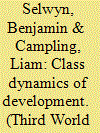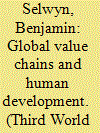| Srl | Item |
| 1 |
ID:
148268


|
|
|
|
|
| Summary/Abstract |
This article argues that class relations are constitutive of development processes and central to understanding inequality within and between countries. Class is conceived as arising out of exploitative social relations of production, but is formulated through and expressed by multiple determinations. The article illustrates and explains the diversity of forms of class relations, and the ways in which they interplay with other social relations of dominance and subordination, such as gender and ethnicity. This is part of a wider project to revitalise class analysis in the study of development problems and experiences.
|
|
|
|
|
|
|
|
|
|
|
|
|
|
|
|
| 2 |
ID:
148269


|
|
|
|
|
| Summary/Abstract |
Global Value Chain (GVC) proponents argue that regional and human development can be achieved through ‘strategic coupling’ with transnational corporations. This argument is misleading for two reasons. First, GVC abstracts firm–firm and firm–state relations from their class-relational basis, obscuring fundamental developmental processes. Second, much GVC analysis promotes linear conceptions of development. This article provides a class-relational framework for GVC analysis. The formation and functioning of GVCs and the developmental effects associated with them are products of histories of evolving, and often conflictive, class relations. A study of export fruiticulture in Northeast Brazil provides empirical support for these arguments.
|
|
|
|
|
|
|
|
|
|
|
|
|
|
|
|
| 3 |
ID:
144279


|
|
|
|
|
| Summary/Abstract |
This article outlines the theory and practice of labour-centred development (LCD). Much development thinking is elitist, positing states and corporations as primary agents in the development process. This article argues, by contrast, that collective actions by labouring classes can generate tangible developmental gains and therefore that, under certain circumstances, they can be considered primary development actors. Examples of LCD discussed here include shack-dwellers’ movements in South Africa, the landless labourers’ movement in Brazil, unemployed workers’ movements in Argentina and large-scale collective actions by formal sector workers across East Asia. The article also considers future prospects for LCD.
|
|
|
|
|
|
|
|
|
|
|
|
|
|
|
|